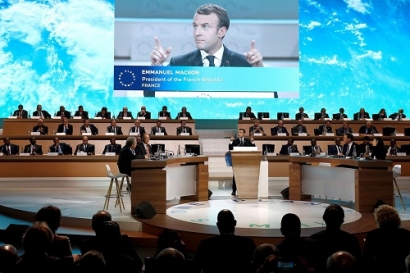
According to its website, the summit is an alliance of hundreds of global leaders from all sectors to address the fight against climate change. The aim is to find new means of financing the adaptation of our ways of life to inevitable transformations, of further speeding up the reduction of greenhouse gas emissions, and of ensuring climate issues are central to the financial sector.
Macron opened the meeting saying, “It is time to turn word into deed. We all have to be accountable. This One Planet Summit for a new generation…it’s not just about negotiating a statement, it is about the 120 states represented here.
“It is not just one person nor one country that’s going to change things. What we have to do is very tangibly explain the firm commitments we are making to change what seems to be an unavoidable destiny. The challenge for our generation is to act and act quickly.”
At the meeting, the European Commission presented its new Action Plan for the Planet which includes 10 initiatives for a modern economy. They are all reflected under the 10 political priorities of the Juncker Commission.
Commission President Jean-Claude Juncker, said, "The time has now come to raise our game and set all the wheels in motion — regulatory, financial and other — to enable us to meet the ambitious targets we have set ourselves. This is a necessity dictated by our current living conditions as well as those of future generations. This is the time that we must act together for the planet. Tomorrow will be too late."
The World Bank made a number of announcements at the summit, including a statement that they will no longer finance upstream oil and gas after 2019.
Also, to further accelerate climate action, the World Bank Group will be working with various partners to deepen climate action.
For the first time, all the Multilateral Development Banks and all International Development Finance Club Members issued a joint statement aligning their finance with the Paris Agreement and identifying areas where they will work together to advance climate-smart development.
The UN Environment and BNP Paribas signed an agreement at the summit to establish Sustainable Finance Facilities, collaborative partnerships aimed at raising development capital to drive sustainable economic growth in emerging countries.
They will collaborate to identify suitable commercial projects with measurable environmental and social impact, with a target of capital funding amounting to $10 billion by 2025 in developing countries. The aim is to support smallholder projects related to renewable energy access, agroforestry, water access and responsible agriculture among other sustainable activities.
The initiative for the summit came from Macron at the G20 Summit in Hamburg in July 2017, following the announcement by the United States administration that it would be pulling out of the Paris Agreement.
Over 1000 delegates participated in the summit, which will continue on Wednesday, Dec. 13, with various side-events.
Ten EU Initiatives for a Modern and Clean Economy (click on title for more information):
1. Putting the Financial Sector at the Service of the Climate
2. EU External investment Plan - Opportunities for Africa and the EU Neighbourhood region
3. Urban Investment Support for European Cities
4. Clean Energy for Islands Initiative
5. Structural Support Action for Coal and Carbon Intensive Regions
6. European Youth for Climate Action
7. Smart Finance for Smart Buildings Investment Facility
8. EU Rulebook for Investment in Energy Performance of Buildings
9. Investing in Clean Industrial Technologies
10. Clean, Connected and Competitive Mobility

